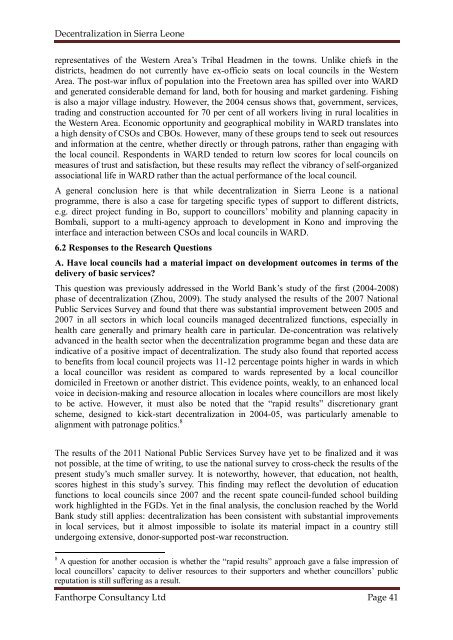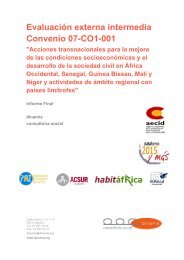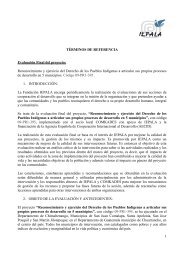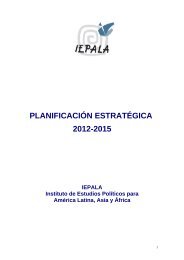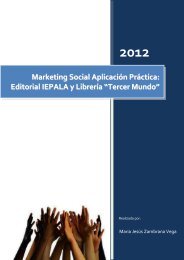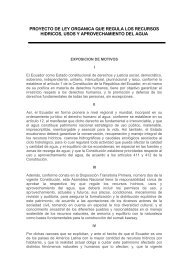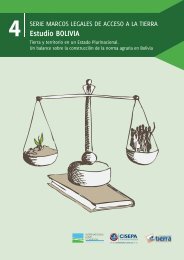Decentralization in Sierra Leone - Research for Development
Decentralization in Sierra Leone - Research for Development
Decentralization in Sierra Leone - Research for Development
You also want an ePaper? Increase the reach of your titles
YUMPU automatically turns print PDFs into web optimized ePapers that Google loves.
<strong>Decentralization</strong> <strong>in</strong> <strong>Sierra</strong> <strong>Leone</strong>representatives of the Western Area’s Tribal Headmen <strong>in</strong> the towns. Unlike chiefs <strong>in</strong> thedistricts, headmen do not currently have ex-officio seats on local councils <strong>in</strong> the WesternArea. The post-war <strong>in</strong>flux of population <strong>in</strong>to the Freetown area has spilled over <strong>in</strong>to WARDand generated considerable demand <strong>for</strong> land, both <strong>for</strong> hous<strong>in</strong>g and market garden<strong>in</strong>g. Fish<strong>in</strong>gis also a major village <strong>in</strong>dustry. However, the 2004 census shows that, government, services,trad<strong>in</strong>g and construction accounted <strong>for</strong> 70 per cent of all workers liv<strong>in</strong>g <strong>in</strong> rural localities <strong>in</strong>the Western Area. Economic opportunity and geographical mobility <strong>in</strong> WARD translates <strong>in</strong>toa high density of CSOs and CBOs. However, many of these groups tend to seek out resourcesand <strong>in</strong><strong>for</strong>mation at the centre, whether directly or through patrons, rather than engag<strong>in</strong>g withthe local council. Respondents <strong>in</strong> WARD tended to return low scores <strong>for</strong> local councils onmeasures of trust and satisfaction, but these results may reflect the vibrancy of self-organizedassociational life <strong>in</strong> WARD rather than the actual per<strong>for</strong>mance of the local council.A general conclusion here is that while decentralization <strong>in</strong> <strong>Sierra</strong> <strong>Leone</strong> is a nationalprogramme, there is also a case <strong>for</strong> target<strong>in</strong>g specific types of support to different districts,e.g. direct project fund<strong>in</strong>g <strong>in</strong> Bo, support to councillors’ mobility and plann<strong>in</strong>g capacity <strong>in</strong>Bombali, support to a multi-agency approach to development <strong>in</strong> Kono and improv<strong>in</strong>g the<strong>in</strong>terface and <strong>in</strong>teraction between CSOs and local councils <strong>in</strong> WARD.6.2 Responses to the <strong>Research</strong> QuestionsA. Have local councils had a material impact on development outcomes <strong>in</strong> terms of thedelivery of basic services?This question was previously addressed <strong>in</strong> the World Bank’s study of the first (2004-2008)phase of decentralization (Zhou, 2009). The study analysed the results of the 2007 NationalPublic Services Survey and found that there was substantial improvement between 2005 and2007 <strong>in</strong> all sectors <strong>in</strong> which local councils managed decentralized functions, especially <strong>in</strong>health care generally and primary health care <strong>in</strong> particular. De-concentration was relativelyadvanced <strong>in</strong> the health sector when the decentralization programme began and these data are<strong>in</strong>dicative of a positive impact of decentralization. The study also found that reported accessto benefits from local council projects was 11-12 percentage po<strong>in</strong>ts higher <strong>in</strong> wards <strong>in</strong> whicha local councillor was resident as compared to wards represented by a local councillordomiciled <strong>in</strong> Freetown or another district. This evidence po<strong>in</strong>ts, weakly, to an enhanced localvoice <strong>in</strong> decision-mak<strong>in</strong>g and resource allocation <strong>in</strong> locales where councillors are most likelyto be active. However, it must also be noted that the “rapid results” discretionary grantscheme, designed to kick-start decentralization <strong>in</strong> 2004-05, was particularly amenable toalignment with patronage politics. 8The results of the 2011 National Public Services Survey have yet to be f<strong>in</strong>alized and it wasnot possible, at the time of writ<strong>in</strong>g, to use the national survey to cross-check the results of thepresent study’s much smaller survey. It is noteworthy, however, that education, not health,scores highest <strong>in</strong> this study’s survey. This f<strong>in</strong>d<strong>in</strong>g may reflect the devolution of educationfunctions to local councils s<strong>in</strong>ce 2007 and the recent spate council-funded school build<strong>in</strong>gwork highlighted <strong>in</strong> the FGDs. Yet <strong>in</strong> the f<strong>in</strong>al analysis, the conclusion reached by the WorldBank study still applies: decentralization has been consistent with substantial improvements<strong>in</strong> local services, but it almost impossible to isolate its material impact <strong>in</strong> a country stillundergo<strong>in</strong>g extensive, donor-supported post-war reconstruction.8 A question <strong>for</strong> another occasion is whether the “rapid results” approach gave a false impression oflocal councillors’ capacity to deliver resources to their supporters and whether councillors’ publicreputation is still suffer<strong>in</strong>g as a result.Fanthorpe Consultancy Ltd Page 41


